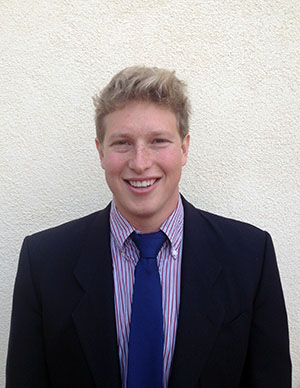Michael Kuhn, 26, Economics
Michael Kuhn originally wanted to be a courtroom lawyer. His dad is an economist, though, and started taking him to conferences when he was 10 years old. While Kuhn never intended to follow in his dad’s professional footsteps, he says, “the effect of him being an economist on me had nothing to do with his work but a lot to do with how he taught me to think. From a young age, if I asked a question he thought I could answer, his first response would simply be, ‘Think!’”
When the younger Kuhn (who grew up in Ontario, Canada, and Santa Barbara, California) was a University of California-Los Angeles undergraduate, he declared economics as his major because the school offered no official pre-law track. Once he started taking the classes, though, he grew interested. Michael Rothschild, Kuhn’s undergraduate thesis advisor, introduced him to the value of early-childhood health and educational programs, like WIC and Head Start, from an economic perspective.
(Photo: Michael Kuhn)

Years later, halfway through his Ph.D. at the University of California-San Diego, Kuhn got into a conversation with his fiancée, a social worker for foster children. “I was doing abstract lab experiments on choices in highly uncertain environments. She basically asked me, ‘What does this have to do with anything in the real world?’” Not long after that, Kuhn quit working on theoretical concepts and started doing data analysis instead.
“It was instantly rewarding,” he says, “but required a completely different knowledge base and toolkit.” Kuhn switched working groups within his department and had to start over when it came to proving to faculty members that he had the necessary skills. The next paper he wrote became the cornerstone of his future research—and helped him land a job as a professor at the University of Oregon, where he starts this fall.
“All the scenarios I examine are designed to inform policy relevant to low-income decision makers,” Kuhn says. Specifically, he studies the relationship between patience and financial decisions, especially in regard to how people spend or save limited resources, like food stamps or small paychecks. Welfare policies, he says, treat households as single decision-making units even though years of research prove that they’re not. One of his key findings is this: “Food stamps appear to be budgeted with more prudence when mothers have more control over access to them.”
Kuhn’s research is motivated by his belief that many social programs need to be redesigned. “The Earned Income Tax Credit, which is basically the pillar of current welfare policy,” he says, “is distributed in a great way to help households make big purchases—cars, college deposits, flat-screen TVs—but in the worst way possible to alleviate food insecurity.”
Kuhn wants to advocate for these redesigns via scientific research. He studies hard data from the real world and from lab experiments, and no longer has much patience for unsubstantiated conjecture: “Our textbooks are filled with theories and conclude with facts that contradict one another and prove all the theories to be incorrect.”
Kuhn surmises that this could be because economics is such a young field—only about 50 years old. But he also notes the divide between theoretical and applied economists. “No one works on Lamarckian theories of evolution anymore because experiments and observation proved him wrong,” he says. “Plenty of economists work on theories that we have known for decades are mostly incorrect, yet they still get used over and over again as justifications for all sorts of economic and social policy. This is frustrating and harmful, and I think it’s my job to help make things better.”
Teaching is another part of his job that Kuhn takes seriously. It’s a skill he sees other graduate students not valuing enough, but his talent at it (“my Mock Trial skills come in handy,” he says) earned him UCSD’s Teaching Assistant Excellence Award.
He’s grateful for other strong teachers who have helped him along the way, especially James Andreoni, his thesis advisor at UCSD. “When my dad was a graduate student,” Kuhn says, “he had to make an appointment with his advisor’s secretary days in advance to meet with him for an hour. I’ve had weeks where I’ve spent 10 hours in Jim’s office without any appointments. This kind of generosity is surely costly to him, and being on the receiving end of it has affected my perspective on the job we do.”
Andreoni is shaping the kind of thinker Kuhn is becoming: “I tend to leap from idea to idea very quickly,” Kuhn says, “whereas he slows me down and gets me to think twice or three times about a statement before moving on. This is just as much about realizing an idea is much better than it sounds as realizing that a seemingly profound statement is actually quite stupid. I hope his deliberateness and clarity show up in my work for my entire career.”
That career is likely to affect policymaking, especially toward low-income families. Over the next decade or so, Kuhn sees himself doing practical work to improve financial rules and welfare programs. “Being a policy advocate for households is something that I think could provide immense value,” he says. “Hopefully by then economists might agree on something to advocate for.”
After granting the interview for this piece, Kuhn, who is mostly modest, worried that his responses to questions came off as self-righteous. “I should say,” he appended, “that many economists, old and young alike, share my sentiments about problems with rigid ideology among loud voices in the profession.”
See our complete 2014 list of the 30 top thinkers under 30 here.



